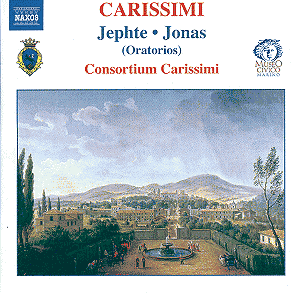Carissimiís oratorios
were a development of the laudi sacri
which composers such as Palestrina and
Annimuccia wrote for St. Philip Neriís
meetings held in his oratorio
(or place of prayer). Carissimi developed
the musical form so that it became a
full drama, miniature in scale but full
of dramatic force. We have little concrete
information about his activities at
the Oratorio del Santissimo Crocifissio
for which the oratorios were probably
written. The CD booklet quotes a traveller
in 1650 describing Ďmusic so sweet and
harmoniousí, which was performed by
some twenty voices, organs, lute, viola
and two violins.
Nowadays Carissimiís
oratorios have come to be performed
by chamber choirs accompanied by large-scale
forces; this approach was taken by John
Eliot Gardiner on his 1990 recording
of Jephte and Jonas. An
alternative approach is to use smaller
scale, madrigalian ensembles, which
probably more closely reflect the conditions
of first performance. This approach
brings out the chamber textures and,
with only one or two voices to a part
in the full choral sections, helps knit
the solo passages to the tutti sections.
It is this approach
which is taken by the Consortium Carissimi
on their new disc of oratorios. The
Consortium uses a choir of thirteen
with two violins, viola da gamba, violone,
archlute, theorbo, organ and harpsichord.
The solos are performed by members of
the choral group. Parts are allocated
widely, with some nine singers taking
solo parts in Jephte.
The group was founded
in 1996 and is dedicated to exploring
Carissimiís vast output. But here, on
their first recording for Naxos, they
are playing relatively safe by performing
two of his best know works, Jephte
and Jonae.
Jephte is based
on the biblical text from Judges, but
the oratorio uses a considerably expanded
text. Besides paraphrasing the biblical
narrative the anonymous librettist has
written entirely new texts for the dramatic
moments. The narrator or Historicus
is sung predominantly by tenor Fabio
Furnari and he creates a fine, dramatic
narrative whilst keeping to the chamber-like
textures of the piece. At times, though,
Carissimi passes the storyline to other
singers. Jephtaís son is played by Nadia
Caristi, who displays a fine, focused
soprano voice.
In the ensemble passages,
the singers make a wonderfully flexible,
supple sound; listening to any of the
cori in Jephte is a pleasure.
But, as in many cases where the choral
singers perform solos as well, not all
of the soloists are quite up to the
demands of the solo lines. All perform
creditably, but I found myself noticing
small faults rather than appreciating
the expressive nature of the music.
In structure, Jonae
is very similar to Jephte and
similar strictures apply to the performance.
One of the highlights of the disc is
the chorus Et proeliabantur venti
which uses two choirs vividly to describe
the storm which threatens Jonahís ship.
Between the two oratorios,
Consortium Carissimi perform the serenade
Dai piu riposte abissi (From
the most hidden abysses). In this case
they transpose the solo parts from two
sopranos and bass to two tenors and
bass; perhaps to our advantage as the
tenor Fabio Furnari is one of the strongest
soloists on the disc.
The booklet includes
the full Latin and English texts, printed
in parallel; something that you cannot
take for granted nowadays in budget-priced
discs. However, the disc is not a long
one and there would have been plenty
of room to include a further Carissimi
work.
I wish I could be more
enthusiastic about this disc. Much work
and scholarship has gone into it and
the performances are never less than
creditable, but somehow it just misses
the mark. However recordings of Carissimiís
oratorios are not thick on the ground
and this disc would still make an admirable
introduction.
Robert Hugill
see also
review by Kevin Sutton

